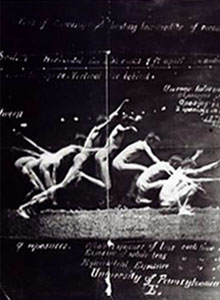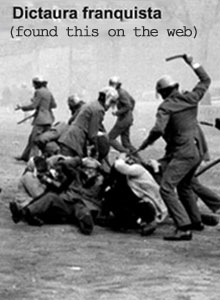







 |
 |
 |
 |
 |
 |
 |
 |
|||||||
this is
a little, private, sailboat.
it
offers you vista points on
political communication.
hopefully we can dive below the surface.
this allegory wants
to summarize and dramatize that
everyday all of us have the chance
to get inspired to new ideas for our lives.
but as we are depending on
each other in our social group
we must stick to conventional forms.
although the convention might be stupid.
but nobody is saying it out loud.
because it has become normality.
saying it out loud is
true
political communication.
in contrast the instruments of
ordinary political communication
are used e.g. by parties and organizations
to persuade everybody of their proposals.
this is not a bad thing.
it's necessary in a democracy,
where we depend on each other.
nevertheless in both cases,
forming and opening conventions (or: rules)
it is important and helpful to understand
how we talk,
write and paint -
the form
also limits which ideas can be shared,
when, where and with whom.
by touring this site
you can get to know different situations
when these forms influence your thinking.
maybe by realizing them
we get
motivated
to
break
them see listen do something other.
a more detailed explanation of this is here
and for those who are into theory:
I think in the end also forms
are shaped by economic interests ("apparatus of signs").
and felix, sorry
no biology here.
films with inspiring strategies
Man with a movie camera (1929)
Zidane - a 21st century portrait
Le chagrin et la pitié (trailer different)
the net (by lutz dammbeck)
Must read after my death
The Goebbels Experiment
Koqaanisquatsi (trailer horrible)
Shirin
The Corporation
darwin's nightmare (controversial)
Olympia
Tree of life (fictional)
more classics => criterion collection
how political campaigns work
---updating section---
remarkable political campaigns
---updating section---
texts on politics (still offline)
foucault: the order of discourse
ranciere: dissensus
gramsci: hegemony
butler: What is criticism?
good, bad and ugly types of media
(still offline)
habermas 06: pol. comm. in media society
adorno: culture industry (huyssen replies)
haller: das ende der beliebigkeit
kaehn 02: chomsky's propaganda model
hind 10: return of the public
films with and about fascinating people
encounters at the end of the world
gernstls reisen (german)
when you're strange
examined life
être et avoir
man on wire (trailer horrible)
Wheel of Time
everyday new views on the world
PHOTOGRAPHY
series from new documentary photographers
stories from the news in real big pictures
daily newsletter on good new photo work
great street photography inspiration
Links to the best 10 street pho. blogs
photo news from America
Photo News from the Netherlands
Festival de Perpignan
Street photography magazine
Best unknown street photographer
new york times visual journalism
evolving doc & art photographers
visual reportages from art exhibits
free street photography book
documentary film
The Documentary Blog
The Criterion Collection
news by an alliance of major doc festivals
good news and links to all major festivals
Aktuelle Doku-Tipps im deutschen Fernsehen
Video Art Gallery
milestones of film history online
arte webdocs (+ magnum in motion)
news & archives on German documentaries
european documentary network
last week's shows from cultural tv arte
a few resources of fictional films
---updating section---
texts on documentary work (still offline)
further down = more theoretical
sekula: 11 theses on documentary
sekula: dismantling modernism
van den heuvel: 10 current trends
steyerl: articulation of protest
ruby: sharing power/multivocal documentary
steyerl: documentary uncertainty
rosler: postdocumentary
Steyerl u.a.: The Green Room
frohne: paradoxa des politischen
meyer: grenzen des ästhetischen regimes
glöde: ästhetik und politik
What is criticism? (butler)
films about today
Workingman's death
manufactured landscapes
enjoy poverty
exit through the gift shop
l'encerclement
the inside job
burma VJ
journeys with george
megacities
north korea a day in the life
hundstage
herr wichmann von der cdu
czech dream
god grew tired of us
darwin's nightmare (controversial)
my own texts (most still offline)
pure visual ideology
hollywood's narrative models: constraints
understanding mass media with foucault
financial cricis press analysis (summary)
illusions of authenticity in documentary
song of the drama: functions of film music
my own little films
concrete castles (german)
mini globalization (still re-editing..)
send me your favorites:
me(AT)patrickfink.de
what it is all about: you (still offline)
knoblauch: constitution of the subject
jezierska: mouffe vs habermas
already thought: life
everybody is an intellectual - yet in society not everybody is in the position of the intellectual (gramsci)
periods of luck have not been written down in the history books of the world (after hegel)
if ever something better than love is invented, i think i would still practice it alongside (remco campert)
already thought: communicating
A work of art may be called revolutionary, if, by virtue of the aesthetic transformation, it represents, in the exemplary fate of individuals, the prevailing unfreedom and the rebelling forces, thus breaking through the mystified (and petrified) social reality, and opening the horizon of change (liberation). In this sense, every authentic work of art would be revolutionary, i.e. subversive of perception and understanding, an indictment of the established reality, the appearance of the image of liberation. (marcuse, aesthetic dimension)
already thought: the media
actually it does not matter
if mass media
is really powerful.
crucial is rather if one assumes
that mass media is powerful.
if that is the case, everybody behaves
as if the media had political power.
the outcome of this is the same
as actual power of mass media.
(winfried Schulz)
already thought: politics
if today social relations are not determined by material production and consumption anymore, but by the media and its images, political action should start from media policies.
what market fundamentalists get wrong is that state intervention can, and in most given societies has to, create the freedom for citizens to then participate as equals (after: mouffe/laclau, hegemony and radical democracy)
historically democracies are superior to other forms of
political systems because their open public sphere constantly pressures society and politicians to learn (sarcinelli)
discursive appropriation is the westen style of rule (said, translated back to english from german)
already thought: economy
Eine Ware scheint auf den ersten Blick ein selbstverständliches, triviales Ding. Ihre Analyse ergibt, daß sie ein sehr vertracktes Ding ist, voll metaphysischer Spitzfindigkeit und theologischer Mucken. (Karl Marx)